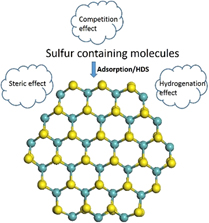Crossref Citations
This article has been cited by the following publications. This list is generated based on data provided by
Crossref.
Díaz de León, Jorge
Ramesh Kumar, Chowdari
Antúnez-García, Joel
and
Fuentes-Moyado, Sergio
2019.
Recent Insights in Transition Metal Sulfide Hydrodesulfurization Catalysts for the Production of Ultra Low Sulfur Diesel: A Short Review.
Catalysts,
Vol. 9,
Issue. 1,
p.
87.
Zhao, Guang-Yi
Deng, Hua
Tyree, Nathaniel
Guy, Michael
Lisfi, Abdellah
Peng, Qing
Yan, Jia-An
Wang, Chundong
and
Lan, Yucheng
2019.
Recent Progress on Irradiation-Induced Defect Engineering of Two-Dimensional 2H-MoS2 Few Layers.
Applied Sciences,
Vol. 9,
Issue. 4,
p.
678.
Ramírez, Jorge
Castillo-Villalón, Perla
Gutiérrez-Alejandre, Aída
Ayala, Alejandro
Cruz-Garduza, Oscar
Ayala, Mónica
Quintana-Owen, Patricia
and
Romero-Galarza, Adolfo
2020.
Interaction of different molecules with the hydrogenation and desulfurization sites of NiMoS supported particles with different morphology.
Catalysis Today,
Vol. 353,
Issue. ,
p.
99.
Mendoza-Nieto, J. Arturo
Vizueth-Montes de Oca, Alfredo
Calzada, Lina A.
and
Klimova, Tatiana E.
2021.
Trimetallic NiMoW and CoMoW catalysts supported on SBA-15 modified with titania or zirconia for deep hydrodesulfurization.
Catalysis Today,
Vol. 360,
Issue. ,
p.
78.
Du, Yi
Wooler, Bradley
Hoy, Scott J.
Lebron, David J.
and
Harper, Michael R.
2021.
Detailed Mechanistic Studies of Hydroprocessing Catalysts on Real Feeds for Ultra-Low-Sulfur Diesel Production.
Energy & Fuels,
Vol. 35,
Issue. 18,
p.
14671.
Araujo, Lennon A.
Bezerra, Charleston O.
Cusioli, Luis F.
Rodríguez, Miguel T.
Gomes, Raquel G.
and
Bergamasco, Rosangela
2021.
Diclofenac adsorption using a low-cost adsorbent derived from Guazuma ulmifolia Lam. fruit via chemical and thermal treatment.
Journal of Environmental Chemical Engineering,
Vol. 9,
Issue. 6,
p.
106629.
Antipin, Igor S.
Alfimov, Mikhail V.
Arslanov, Vladimir V.
Burilov, Vladimir A.
Vatsadze, Sergey Z.
Voloshin, Yan Z.
Volcho, Konstantin P.
Gorbatchuk, Valery V.
Gorbunova, Yulia G.
Gromov, Sergey P.
Dudkin, Semyon V.
Zaitsev, Sergei Yu.
Zakharova, Lucia Ya.
Ziganshin, Marat A.
Zolotukhina, Anna V.
Kalinina, Maria A.
Karakhanov, Eduard A.
Kashapov, Ruslan R.
Koifman, Oskar I.
Konovalov, Alexander I.
Korenev, Vladimir S.
Maksimov, Anton L.
Mamardashvili, Nugzar Zh.
Mamardashvili, Galina M.
Martynov, Alexander G.
Mustafina, Asiya R.
Nugmanov, Ramil I.
Ovsyannikov, Alexander S.
Padnya, Pavel L.
Potapov, Andrei S.
Selektor, Sofiya L.
Sokolov, Maxim N.
Solovieva, Svetlana E.
Stoikov, Ivan I.
Stuzhin, Pavel A.
Suslov, Evgenii V.
Ushakov, Evgeny N.
Fedin, Vladimir P.
Fedorenko, Svetlana V.
Fedorova, Olga A.
Fedorov, Yury V.
Chvalun, Sergei N.
Tsivadze, Aslan Yu.
Shtykov, Sergei N.
Shurpik, Dmitriy N.
Shcherbina, Maxim A.
and
Yakimova, Luidmila S.
2021.
Functional supramolecular systems: design and applications.
Russian Chemical Reviews,
Vol. 90,
Issue. 8,
p.
895.
Wang, Jie
Yang, Zhen
Mao, Baoguang
Wang, Yixin
Jiang, Yan
and
Cao, Minhua
2022.
Transgenic Engineering on Silicon Surfaces Enables Robust Interface Chemistry.
ACS Energy Letters,
Vol. 7,
Issue. 8,
p.
2781.
Sánchez-Cupil, José Luis
Cuevas-García, Rogelio
Gutiérrez-Alejandre, Aida
and
Ramírez, Jorge
2022.
The role of methoxy species on the transesterification reaction of castor oil on Ni-Mg-Al calcined hydrotalcites.
Catalysis Today,
Vol. 392-393,
Issue. ,
p.
31.
Del Plá, Julián
and
Pis Diez, Reinaldo
2024.
A computational study of the role of cobalt in thiophene adsorption on small Mo and MoCo clusters as site models for the HDS process.
Surface Science,
Vol. 749,
Issue. ,
p.
122571.
Valdivieso-Vera, Daniel A.
and
Guerrero-Pérez, M. Olga
2024.
Groups IV, V and VI metal oxide-containing hydrotalcite catalysts: state of the art on their catalytic applications.
Catalysis Today,
Vol. 442,
Issue. ,
p.
114935.
Mayoral, Estela
Hernández-Hernández, Ivonne Judith
Martínez-Magadán, José-Manuel
Klapp, Jaime
Zuriaga-Monroy, Carolina
Ballesteros-Olvera, Miriam
and
Oviedo-Roa, Raúl
2024.
Dissipative Particle Dynamics Using Conductor-Like Screening Model for Real Solvents-Based Interaction Parameters for Classical Simulations of Dibenzothiophene Adsorption on Molybdenum Disulfide Nanoparticles.
ACS Omega,
Vol. 9,
Issue. 46,
p.
45706.


